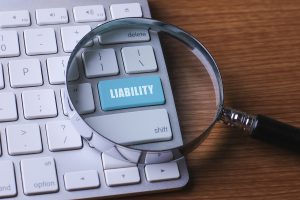How Does Liability Work?
 Michael Babboni
Personal Injury
When you read about people going to court for lawsuits, suing a person, or sometimes even an entire company, the word liability gets used a lot. Liability is the very basis of a lawsuit, especially a personal injury or wrongful-death related case. But how exactly does liability work? What circumstances have to occur for a person or company to be liable for something? We’ll take a closer look.
Michael Babboni
Personal Injury
When you read about people going to court for lawsuits, suing a person, or sometimes even an entire company, the word liability gets used a lot. Liability is the very basis of a lawsuit, especially a personal injury or wrongful-death related case. But how exactly does liability work? What circumstances have to occur for a person or company to be liable for something? We’ll take a closer look.It’s Not About Guilt
In criminal cases, the final verdict being sought for someone that is charged with criminal violations is whether that person is guilty of the accused crimes, or not guilty. In these cases, guilt is normally regarded as having done something that is both bad and illegal, thus justifying the use of someone being called a criminal, and punished in jail for those crimes.
However, when you talk to a personal injury lawyer in St. Petersburg about a lawsuit, this is not about determining guilt, because in most cases the act committed wasn’t a criminal violation. Instead, the goal is to determine fault, because everyone has certain responsibilities. And finding fault with someone means that they have failed in their expected responsibilities.
Liability, in other words, is about assigning blame and saying, essentially, “Someone was expected to do something, and they didn’t, which resulted in an injury.”
Assigning Fault
So if the goal of a lawsuit is to assign liability to the responsible party, then how exactly does this occur? In Florida courts, this is done in one of three ways.
The Settlement
In this case, the responsible party already realizes that fault is there, and is easily proven. In such cases, a lawsuit in court is a waste of everyone’s time and money, since the court would be very likely to rule in favor of the plaintiff. Settlements are out of court agreements to take on liability and provide financial compensation.
The Judge
In some cases, there will be a dispute, and no out of court resolution is possible, so the case goes to court, and the lawyers present their arguments to a judge. In this case, it is the judge who will make the final decision about whether to find a defendant liable or not. Cases involving judges often occur in situations where many complex legal circumstances are at play. The complexity of the case usually means that a judge’s higher degree of legal understanding would be fairer for both parties.
The Jury
Finally, there is the classic courtroom situation, where jurors are picked who must then listen to the arguments and testimony of the lawyers for both sides of the argument. As with criminal cases, a person undertaking a lawsuit can have a jury of peers make the final decision on liability or not. This usually means that much more simple explanations are required, but, as with a criminal case, usually, a unanimous decision is required by the jury to reach a verdict.
Liability in any lawsuit is a “moving target,” and how easy or difficult it is to assign liability depends entirely on the circumstances of the case.
